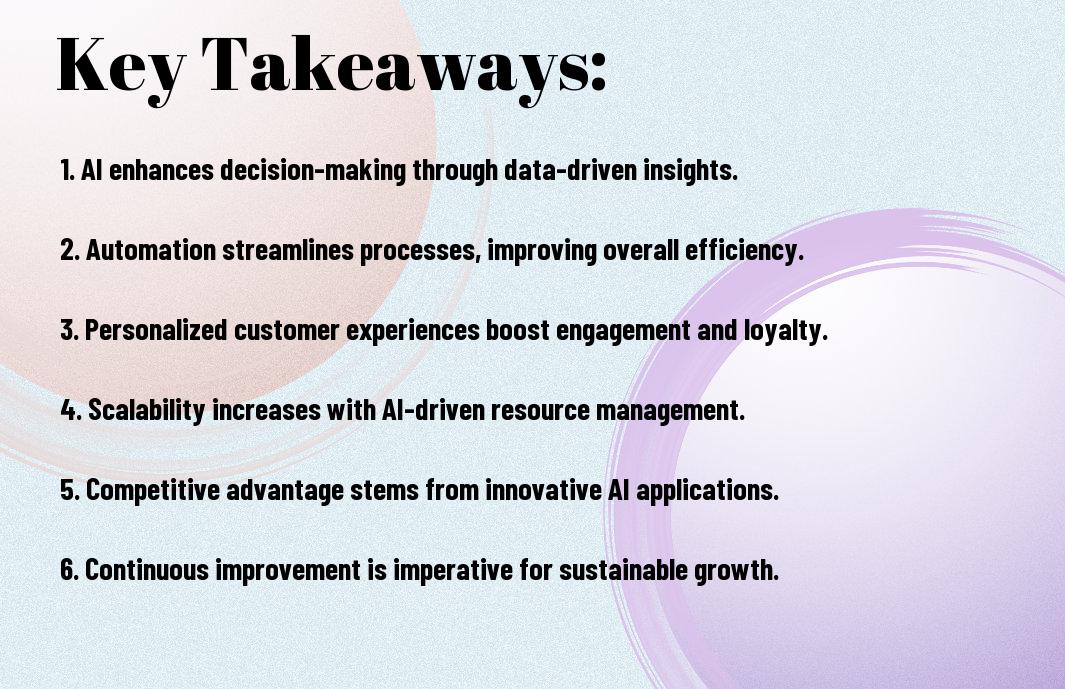As you navigate the challenges of growing your business, you’re likely exploring innovative ways to drive transformation and stay ahead of the competition. You understand that scaling your company requires more than just increasing revenue – it demands strategic investments in technology that can propel your business forward. Your journey from startup to scale-up can be accelerated with the power of Artificial Intelligence (AI), and this post will explore how AI can fuel your business transformation, helping you make informed decisions to achieve sustainable growth.
Key Takeaways:
- AI adoption is a significant driver of business transformation, enabling companies to scale up and achieve exponential growth by automating processes, enhancing decision-making, and improving customer experiences.
- Successful scale-ups leverage AI to unlock new revenue streams, optimize operations, and gain a competitive edge in the market, allowing them to stay ahead of the curve and adapt to changing business landscapes.
- AI-powered data analytics is a key factor in informing business strategy, providing insights that help companies make data-driven decisions, identify new opportunities, and mitigate potential risks.
- The integration of AI into existing business models requires a strategic approach, including investments in talent, technology, and process redesign, to ensure seamless adoption and maximize the benefits of AI-driven transformation.
- As companies scale up with AI, they must prioritize ongoing innovation, continuous learning, and a culture of experimentation to fully harness the potential of AI and maintain a competitive advantage in an increasingly digital landscape.

The Tipping Point of AI Adoption
To reach the tipping point of AI adoption, you need to understand the factors that drive its implementation in your business, and how it can fuel your transformation from a startup to a scale-up.
Why Small Startups Embrace AI First
The ability to innovate and adapt quickly is what sets small startups apart, and you’ll find that they often embrace AI first to gain a competitive edge and drive growth in your business.
The Psychology of Technological Resistance
Resisting change is natural, and you may find yourself hesitant to adopt AI due to concerns about job displacement or the complexity of implementation, but understanding the psychology behind this resistance can help you overcome it and unlock the full potential of AI in your business.
Due to the fear of the unknown, you may be hesitant to adopt AI, but as you learn more about its capabilities and benefits, you’ll become more confident in its ability to transform your business, and you’ll be able to make informed decisions about how to implement it in a way that complements your existing operations and drives growth.
AI as the Great Business Equalizer
While AI is often associated with large corporations, you can leverage it to transform your business, regardless of its size. AI helps you automate tasks, gain insights, and make informed decisions, allowing you to compete with larger companies.
David vs. Goliath: How AI Levels the Playing Field
Beneath the surface of traditional business hierarchies, AI creates opportunities for you to innovate and disrupt markets, enabling your company to challenge larger competitors.
The Counterintuitive Economics of AI Implementation
Around the time you consider implementing AI, you may think it’s expensive, but AI can actually help you reduce costs and increase efficiency in the long run, making it a worthwhile investment for your business.
Business owners like you are often surprised to find that AI implementation can have a positive impact on their bottom line. As you explore AI solutions, you’ll discover that they can help you streamline processes, reduce labor costs, and improve productivity, leading to increased profitability and competitiveness in your market. You’ll be able to allocate your resources more effectively, making your business more agile and responsive to changing circumstances.

The Thin Slice of AI Decision-Making
Keep in mind that AI decision-making is a complex process that involves multiple factors. As you navigate the world of AI, you’ll discover that machines can analyze vast amounts of data and make decisions quickly.
How Machines Make Split-Second Judgments
Behind the scenes, machines use sophisticated algorithms to process information and make judgments in a fraction of a second. You’ll be amazed at how accurately they can predict outcomes and make decisions that impact your business.
When Algorithmic Intuition Outperforms Human Expertise
Algorithmic decision-making can be surprisingly effective, often outperforming human intuition in certain situations. You’ll find that AI can analyze patterns and make predictions that might elude even the most experienced experts.
Make no mistake, when algorithmic intuition outperforms human expertise, it’s a game-changer for your business. You’ll be able to leverage AI to make data-driven decisions, optimize processes, and drive growth. As you explore this phenomenon, you’ll discover that AI can help you identify new opportunities, mitigate risks, and stay ahead of the competition, ultimately transforming your business in profound ways.
Outliers: Unexpected AI Success Stories
For your business to thrive, you need to explore unconventional AI applications, as seen in A.I. Is Changing How Silicon Valley Builds Start-Ups, where innovators leverage AI to drive growth.
The 10,000 Hours Rule Reimagined for Machine Learning
Unpredictably, you’ll find that machine learning requires a different approach, one that emphasizes data quality over quantity, allowing you to achieve expertise in a shorter timeframe.
Companies That Defied Conventional AI Wisdom
That being said, you’ll discover companies that successfully applied AI in unexpected ways, challenging traditional notions and achieving remarkable results, which you can learn from to inform your own strategy.
Also, as you probe deeper into these success stories, you’ll notice that they often involve a willingness to experiment and adapt, allowing you to apply similar principles to your own business and drive transformation through AI-powered innovation, ultimately leading to sustained growth and competitiveness in your industry.
The Social Dynamics of AI-Transformed Organizations
Not surprisingly, the integration of AI into your organization will significantly impact the social dynamics within your company, leading to a more efficient and productive work environment.
How Workplace Hierarchies Evolve With AI
Towards a more flat structure, your organization will likely shift as AI takes over routine tasks, allowing employees to focus on higher-level decision-making and strategy, which will change your role and responsibilities.
The New Rules of Engagement Between Humans and Machines
Besides the technical aspects, you will need to consider how AI will interact with your employees, and how this will affect your company culture, as you navigate the new relationships between humans and machines.
It is crucial to establish clear guidelines and protocols for human-AI collaboration, ensuring that you are leveraging the strengths of both humans and machines to drive innovation and growth, and that your employees are comfortable working alongside AI systems, which will ultimately lead to increased productivity and job satisfaction, as you successfully integrate AI into your organization.
Blink: Making Decisions at AI Speed
Now that you’re scaling your business, you need to make decisions faster. AI helps you analyze vast amounts of data, enabling swift and informed choices.
The Cognitive Load of Human-AI Collaboration
For instance, when you work with AI systems, you must consider the mental effort required to interpret and act on algorithmic insights, ensuring seamless collaboration.
Training Leaders to Trust Algorithmic Insights
To effectively leverage AI, you must develop trust in its decision-making capabilities, which requires educating your leaders on AI-driven analytics and their applications.
Consequently, as you train your leaders to trust algorithmic insights, you’ll notice a significant shift in your decision-making processes, allowing your business to respond more agilely to market changes, and you’ll be able to make data-driven decisions with confidence, driving your business forward with precision and speed.
Final Words
Drawing together the insights from your journey, you now understand how AI fuels business transformation, from startup to scale-up. You’ve seen how AI can enhance your operations, inform your decisions, and drive your growth. As you initiate on your own transformation, you’ll be able to leverage AI to unlock new opportunities, optimize your processes, and stay ahead of the competition, ultimately taking your business to the next level and achieving your goals.
FAQ
Q: What role does AI play in transforming a startup into a scale-up, and how can businesses leverage this technology to drive growth?
A: AI plays a significant role in transforming a startup into a scale-up by automating processes, enhancing decision-making, and improving operational efficiency. Businesses can leverage AI by integrating it into their core operations, such as using machine learning algorithms to analyze customer data, predict market trends, and optimize supply chains. By doing so, companies can accelerate their growth, increase competitiveness, and achieve scale-up status more efficiently.
Q: How can AI be used to drive innovation and improve customer experience in a scale-up business, and what are some examples of successful AI-powered transformations?
A: AI can be used to drive innovation and improve customer experience in a scale-up business by enabling personalized marketing, streamlining customer service, and developing new products and services. For instance, companies can use natural language processing (NLP) to analyze customer feedback, sentiment analysis to gauge market reactions, and predictive analytics to identify new business opportunities. Examples of successful AI-powered transformations include companies like Netflix, which uses AI to personalize content recommendations, and Amazon, which leverages AI to optimize its supply chain and improve customer service.
Q: What are the key challenges and limitations that businesses may face when implementing AI-powered solutions, and how can they overcome these obstacles to achieve successful business transformation?
A: Businesses may face several challenges when implementing AI-powered solutions, including data quality issues, talent acquisition and retention, and integration with existing systems. To overcome these obstacles, companies can invest in data quality management, develop strategic partnerships with AI vendors, and prioritize employee upskilling and reskilling. Additionally, businesses can start with small-scale AI pilots, focus on high-impact applications, and establish clear governance and ethics guidelines to ensure responsible AI adoption and successful business transformation.


